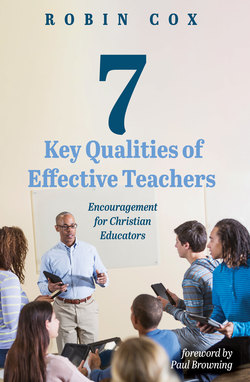Читать книгу 7 Key Qualities of Effective Teachers - Robin Brian Cox - Страница 9
На сайте Литреса книга снята с продажи.
The Vision
ОглавлениеTeachers work in challenging, constantly changing environments where they often feel overwhelmed and unappreciated by those they serve. Teachers are valuable and their individual and collective contributions to the lives of students, families, and colleagues are significant.
During these formative times of a student’s life, the matrices for healthy relationships are shaped—based on realistic self-awareness and empathetic, affirming, faith-filled behavior patterns. These impact marriages, parenting, and whole-life patterns. When parents themselves are broken, a Christian educator is more important than ever.
Christian educators have the authority to positively impact the lives of students and school communities through their transformative attitudes. In these change-agent roles, some probable outcomes—in addition to those mentioned above and which will be dependent on the culture of the particular school environment—may include:
•A safe and caring community, evident by supportive relationships between school personnel, students, their families and extended families or whanau1
•Inspired and intrinsically motivated students
•Students—and staff colleagues, even families of students— enter into a meaningful relationship with Jesus
•Students use their innovative, entrepreneurial, and creative gifts without fear of failure
•Ongoing affirmations of teachers by one another and by school management teams
•A consistent focus, understanding, and support of the health and wellbeing of teachers, which includes manageable stress levels
•Fewer discipline challenges, a reduction in truancy, substance abuse, antisocial behavior, youth suicide, and other youth related mental health issues
•The development of effective communication and relationship-building skills within the school community. For example, more encouragement, empathy, positive peer support, and no judgmental put-downs or bullying
•Families, teachers and students work together to support one another and make a positive difference in their communities
•Students feel the unconditional love and care they crave, feel that their opinions are valued and listened to, and, as they journey through the confusing years of adolescence, feel that their lives have greater meaning and purpose
We are mindful that every teacher is in a different personal space.
We are encouraged to stand tall and Christlike in the grace that embraces our brokenness, conscious of the fact that we never walk alone when the Christian faith, globally, is being battered from all sides. The resurrected Jesus, through the power of the Holy Spirit, is with us every step of the way: “God has said: ‘Never will I leave you; never will I forsake you’” (Heb 13:5).
“How can I do this?” you might be wondering. “Can I do this as a Christian in a secular school?” “How can I show Christian love in a tangible way that does not set me up for abuse?” “How can I do this in a way that will honor God when speaking about faith is not allowed in the classroom?” “How can I do this when we are under so much pressure from management and parents to deliver academic results?”
In moments of frustration and self-doubt, the words of Holocaust survivor and neurologist Viktor Frankel can inspire us: “Everything can be taken from a man or woman but one thing: the last of human freedoms—to choose one’s attitude in any given set of circumstances, to choose one’s own way.”
And, we embrace the life lesson that the apostle Paul shared with the Philippians: “I have learned the secret of being content in any and every situation, whether well fed or hungry, whether living in plenty or in want. I can do all this through him who gives me strength” (Phil 4:12–13).
Who is the student?
A child of God, not a tool of the State.
Who is the teacher?
A guide, not a guard.
What is the faculty?
A community of scholars not a union of mechanics.
Who is the principal?
A master of teaching, not a master of teachers.
What is learning?
A journey, not a destination.
What is discovery?
Questioning the answers, not answering the questions.
What is the process?
Discovering ideas, not covering the content.
What is the goal?
Open minds, not closed issues.
What is the test?
Being and becoming, not remembering and reviving.
What is a school?
Whatever we choose to make it.
—Author unknown
When God gives us children he gives us an assignment, and the assignment quite simply is this: to love them unconditionally, value them highly, and prepare them for a role in life in which they will find meaning and purpose.
—Selwyn Hughes, Christian minister
